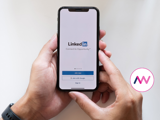"Aaron Wallis done a great job in finding the right calibre of candidate for this role. I will be in touch with you when I need my next position filling. I don't think it will be too long."
Ben Dews

Using Social Media In Recruitment
How to Use Social Media when Recruiting Staff
The impact of social media has become undeniable in the social realms of society. It increasingly is being seen as a corporate resource and not just the domain of the marketing and communications team.
Facebook, Twitter, Instagram, and LinkedIn are all becoming staple checks when recruiting sales staff. A candidate can look great on paper, but social media gives insight into their genuine personality and behaviour outside of formal realms. It's cost-free and can help you tell if a candidate is a good cultural fit - so here's how to do it right.
Shortlisting Candidates
Shortlist candidates from CVs & cover letters first! There is no point wasting time looking at the social media profiles of someone who doesn't have the necessary experience and qualifications for your business. Once shortlisting is done, social media comes into its own - it can be a massive help in deciding tough picks, letting you see who better fits your company as a person. Shortlisting can be incredibly time-consuming, and ultimately the shortlist is all that matters - you can make better use of your time using a recruiter to shortlist for you - letting you pick from the best selection of applicants.
LinkedIn has been a titan of networking for quite a while now. But, where it's really made waves the last year is recruitment; the advent of LinkedIn Jobs in 2014 changed recruitment. Now not only could you network yourself to potential employees, and vice versa, but jobs could be posted, suggested, and applied for through LinkedIn's Website and App. As a social network, it overcomes the issue of social media not listing relevant history and experience, so why use anything else? Because LinkedIn profiles are public, outward-facing - candidates seeking new roles will list all their skills and attributes from all industries - you won't get the specialised address a CV or cover letter would have. LinkedIn is a fantastic way to attract talent and build contacts - but when recruiting, it serves best as a booster - strengthening recruitment rather than replacing it. Head here for our guide on how to use LinkedIn effectively.
Using Social Media as Part of Your Recruitment Selection Process
If it comes to light that in using the likes of Facebook, Twitter, Instagram, LinkedIn etc., to screen candidates, you have discriminated against a candidate, you could have a few legal issues on your hands...
As a recruiting organisation, you should address the following:
-
- You should seek professional legal advice immediately, whether or not this is part of your formal recruitment process. As with all aspects of the law, your company can avoid being tarnished with the highly undesirable 'discriminating' brush if you play by the rules. Even if you don't intend to use social media to recruit, it is still worth checking what records you may need to keep to prove you didn't use social media to recruit.
- Do you really need to screen candidates using social media? What does Facebook or other social sites add to your selection process? Your integrity as a business rests on what you do when people aren't looking, so just because it's free and convenient, don't assume that it is necessary to use it.
- Keep records of how you found the candidates and anything that supports the fact that your hiring decisions were fair and based upon consistent, objective and job-relevant searches.
- You must also bear in mind that social media information can often only be available for a short period of time, so do not rely on finding supporting evidence of your hiring decision too far in the future.
Don't Judge a Book by its Cover
Social media can be a double-edged blade. A candidate can present a fantastic portrait of themselves online only for them to turn up on day one and be the complete opposite of expectations. Similarly, a candidate may look like they go out too much or have non-compatible interests on LinkedIn or Facebook - and you pass them up when their professional actions might be truly impressive. Recruiting through, or using, social media needs to be done in a way that fits your business' interests - ensure they have the skills and won't negatively impact your brand in their behaviour online.
Keep it Simple
Keep recruiting reigned in; it can be tempting to go out and search for new professionals on social media - but leave it to the experts, don't have people outside of your HR department, or recruitment, searching for candidates. If everyone starts searching, it can become addicting and overflow you with many unqualified candidates. Leave it to the pros - like us, and here's why Aaron Wallis is the best recruiter for you.
Top Tips for Social Media Recruitment
Are all parties involved in the recruitment process aware of your policy on social media screening? If not, you could find yourself clashing with opinions on 'social media recruitment' within your team or with external bodies...ensure there is congruency within your team, and they know what your company's stance is on it.
-
- Be upfront and honest with your candidates. Consider informing the candidate of your intentions to check out their profile. Should you discover anything about them that would (according to you) make them unsuitable for the position, this will give them the opportunity to dispute the information and provide their perspective.
- Use all of your resources! Yes, whilst Facebook is free, easy and convenient, it shouldn't be your sole method of recruiting for positions.
- Facebook does not always provide an accurate picture of a candidate or a balanced cross-section of the population.
- Combining your recruiting efforts on Facebook (if you must use it) with the more traditional channels provide a much better solution to finding that perfect candidate and give a more balanced cross-section. Doing this will also then be viewed as fair.
Social media is now crossing over into different sections of businesses. It is essential that employees are clear on the most appropriate ways to use these channels in the content of their work. Learned social network behaviours are likely to be inappropriate for the workplace. It is your responsibility as the Managing Director, HR Manager or the hiring manager etc., to establish clear policies for your team and promote them as necessary. These policies need to be clear and actionable to avoid any misunderstandings or grey areas.
Follow these tips, and you should be fine, but remember, social media is an end-of-cycle process - let a recruiter do the shortlisting for you, and go from there. If you're looking to hire new sales professionals, check out our recruitment page.
Further Reading: The Dangers of Social Media When Searching for a Job - Protect Your Data
Navigate our advice on recruitment planning:
by clicking the following icons:
Date published: 5th March 2024

by Rob Scott
Managing Director

About the author
Rob Scott
Please call us to discuss your vacancy
From our blog
Our employers say...
Our candidates say...







